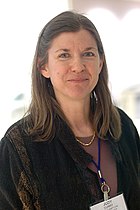From Wikipedia, the free encyclopedia
| Judith A. Curry | |
|---|---|
 | |
| Nationality | American |
| Education | B.S. (1974) in geography, Ph.D. in geophysical sciences (1982) |
| Alma mater | Northern Illinois University, University of Chicago |
| Occupation | Climatologist |
| Employer | School of Earth and Atmospheric Sciences, Georgia Institute of Technology |
| Website | |
| Curry's home page -- Curry's Blog | |
Curry is the co-author of Thermodynamics of Atmospheres and Oceans (1999), and co-editor of Encyclopedia of Atmospheric Sciences (2002), as well as over 140 scientific papers. Among her awards is the Henry G. Houghton Research Award from the American Meteorological Society in 1992.
[edit] Education
Curry graduated cum laude from Northern Illinois University in 1974 with a Bachelor of Science degree in Geography. She earned her PhD degree in Geophysical Sciences from the University of Chicago in 1982.[2][edit] Career
Curry is a professor and Chair of the School of Earth and Atmospheric Sciences at the Georgia Institute of Technology and has held this position since 2002.[3] Curry serves on NASA Advisory Council Earth Science Subcommittee whose mission is to provide advise and recommendations to NASA on issues of program priorities and policy.[4] She is a recent member of the NOAA Climate Working Group [3][5] and a former member of the National Academies Space Studies Board and Climate Research Group.[3][6]Curry is a former professor of Atmospheric and Oceanic Sciences at the University of Colorado-Boulder and has held faculty positions at Penn State University, Purdue, and the University of Wisconsin-Madison.[3][6] Curry has been active in researching possible connections between hurricane intensity and global warming.[7][8] Her research group has also done research linking the size of hurricanes and resulting damage that showed that, among other things, the size of the hurricanes was an important factor in determining the number of tornadoes spawned by the system.[9]
Curry is the co-author of Thermodynamics of Atmospheres and Oceans (1999),[10] and co-editor of Encyclopedia of Atmospheric Sciences (2002).[11] Curry has published over 130 scientific peer reviewed papers.[4] Among her awards is the Henry G. Houghton Research Award from the American Meteorological Society in 1992.[4]
[edit] Climate change controversy
Curry has stated that she is troubled by the "tribal nature" of parts of the climate-science community, and what she sees as stonewalling over the release of data and its analysis for independent review. She has written that climatologists should be more transparent in their dealings with the public and should engage with those skeptical of the scientific consensus on climate change.[12]In February 2010 Curry published an essay called "On the Credibility of Climate Change, Towards Rebuilding Trust" on Watts Up With That and other blogs.[13] Writing in The New York Times, Andrew Revkin calls the essay a message to young scientists who may have been disheartened by the November 2009 climate change controversy known as "Climategate".[12]
In September 2010, Curry created Climate Etc., a blog related to the climate change debate and hosted by Curry. In the site's "About" section, the blog's purpose is stated as "Climate Etc. provides a forum for climate researchers, academics and technical experts from other fields, citizen scientists, and the interested public to engage in a discussion on topics related to climate science and the science-policy interface."[3]
[edit] "An opening mind"
In a June 2011 essay posted at her blog, Curry describes how her thinking on the "climate change controversy" has changed in the past five years:- I’ve been engaging with skeptics since 2006 (before starting Climate Etc., I engaged mainly at Climate Audit). People were suspicious and wondered what I was up to, but the vilification didn’t start until I recommended that people read The Hockey Stick Illusion. The book itself, plus more significantly my vilification simply for recommending that people read the book, has pushed me over the ledge and into a mode of aggressively challenging the IPCC consensus. . . . It is my sad conclusion that opening your mind on this subject sends you down the slippery slope of challenging many aspects of the IPCC consensus.
- Shortly after I started Climate Etc., I received this email message from a colleague:
-
- A few years ago, I started interacting with a skeptic who somehow passed through my “ignore skeptics” filter. He has an engineering degree and is quite knowledgable. My rationale that “all skeptics are troglodytes” has been tattered, and my view of the climate debate has irreversibly changed.
- Opening your mind on this subject is a slippery slope into listening to what skeptics have to say. Sure there are a lot of crazies out there, but there is some very serious skepticism at ClimateAudit and other technical skeptic and lukewarmer blogs. I look forward to a growing climate heretics[14] club, where people that generally support the IPCC consensus (either currently or in the past) dare to question aspects of it.[15]
No comments:
Post a Comment